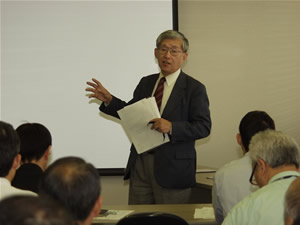
|
|
Management consultant
Makoto Hagiwara
|
Currently in Japan, many acts of impropriety have been occurring that may affect the continuing existence of companies. As background, unique action patterns of Japanese have a major impact and as a representative example, we have “actions with the organization first”, “actions with a group mentality” that we pretend to ignore, and “actions that follow the crowd” where it’s not scary if everyone is going that way. In the current situation, compliance management is essential to corporate activities.
In compliance management, some core competencies are “unwavering corporate principles”, “a corporate culture that can be trusted” and a “top-down structure”.
The first “unwavering corporate principles” is the founding spirit or guiding precepts that each company declare and as such serve as the major constitution that absolutely does not change even when the president does. Top management and of course all of the employees do not forget these corporate principles and they must be reflected in their own actions. To that end, top management and public affairs need to continue transmitting the corporate principles within the company on an ongoing basis.
The second, “a corporate culture that can be trusted” requires the five elements of “transparency”, “respect for people”, “integrity”, “compliance” and “a sense of mission and pride”. Among these, with respect to “respect for people”, it is important to have an awareness that “employees, including those of group companies and temporary employees, are the most important”. To create an excellent corporate culture, it is essential to have monitoring. Vigorous activities must be carried out on an everyday basis to listen to the voice of employees as well as the voices of those outside, such as customers.
The third “a top-down structure” is having a structure such that top management are involved in “compliance management no matter what happens”, and it is important to always continue conveying that to employees.
To make these elements a reality, three types of management are essential, corporate governance, risk management and stakeholders communication (public affairs). Stakeholders communication is an important form of communication in the company and activities by which the voice of employees can reach the top management and the voice of top management can be conveyed to all of the employees by skillfully using tools such as in-house newsletters and the like. Moreover, using Websites, the corporate identity must be conveyed accurately to the outside world.
Comments from the questionnaires conducted after the presentation:
●With respect to the importance of a corporate culture, the explanation was systematic and easy to understand and I understood the points well. A large variety of issues were covered and the talk was also very interesting.
●Compliance is not only a system but something that is important to be implemented internally at all times; therefore, I had the impression that transparency is necessary and means such as monitoring using the Intranet were shown to achieve compliance goals.
●The theme was good and timely. Also, the content, from the perspective of the company and business administration, was very easy to understand. It was a good opportunity to reconsider what form Mitsui Engineering & Shipbuilding should take moving forward.
●I learned a lot from listening to the speaker develop his discussion. I thought, if I had to choose I would put work first, but I reconsidered the importance of corporate principles.
●The presentation brought up some deep examples, which provided hints in grasping the overall image in terms of specifics regarding a theme that tends to be abstract.
These and other opinions and impressions were expressed in the questionnaires.
Afterward, Hamada, Planning Group Leader of NSnet Division, Japan Nuclear Technology Institute presented an overview of the activities of our organization. |







